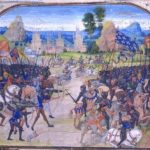Which Ones Are Required Reading?
 Fans of speculative fiction all know J. R. R. Tolkien and C. S. Lewis. In fact, I recently heard Tolkien referred to as the father of modern fantasy. This was an acknowledgment that he did not invent the genre, per se. Before him was Celtic, Norse, Gaelic, and Greek mythology. Nevertheless, his legacy rests on the fact that he created, or “sub-created,” as he said, a world and myths that belong to the modern world.
Fans of speculative fiction all know J. R. R. Tolkien and C. S. Lewis. In fact, I recently heard Tolkien referred to as the father of modern fantasy. This was an acknowledgment that he did not invent the genre, per se. Before him was Celtic, Norse, Gaelic, and Greek mythology. Nevertheless, his legacy rests on the fact that he created, or “sub-created,” as he said, a world and myths that belong to the modern world.
Speculative readers can hardly talk about Tolkien without mentioning Lewis because they both have had such a far-reaching effect on the genre.
But besides these two greats, who else has had an impact on Christian speculative fiction? Specifically, what titles would you consider “required reading” for someone trying to understand the shape and history of present-day Christian speculative fiction?
The question isn’t actually mine. Friend, author, and occasional Spec Faith guest, Mike Duran posed the question over at Facebook.
Unless you’ve already entered the discussion there, I urge you to hold off reading Mike’s question (because he gives some of his answers which might color your own) and the ensuing comments.
As much as I’d like to give my answers, I’m going to refrain for the same reason. I really want to know what you all think.
Mike’s goal is to form a list of ten books that might be considered “required reading,” and he is having a hard time finding that many titles. Personally I think the more a person reads in a genre, the easier it is to find the titles that belong on the list, but that’s beside the point.
In Mike’s question he clarifies that the titles he’s interested in are “not necessarily the best written, but the most influential or enduring books” (emphasis added).
I commented this morning that deciding on which books will last from the contemporary list is next to impossible–something I think commenters here at Spec Faith mentioned in previous posts on this subject (See for example “Hard Work And Cotton Candy“). Personally, I’d prefer to see a “required reading” list consist of the best of the genre.
 So maybe we can do both. How about if you Spec Faith readers nominate as many books (or series, since speculative fiction often comes in groups 😉 ) you wish, but specify which list you think these belong in–1) influential and enduring or 2) best books (which means they are both well-written and rockin’-good stories). Remember, we’re looking for titles of present-day (within the last twenty-five years, or so) Christian speculative fiction.
So maybe we can do both. How about if you Spec Faith readers nominate as many books (or series, since speculative fiction often comes in groups 😉 ) you wish, but specify which list you think these belong in–1) influential and enduring or 2) best books (which means they are both well-written and rockin’-good stories). Remember, we’re looking for titles of present-day (within the last twenty-five years, or so) Christian speculative fiction.
Oooohh, I can hardly wait to give my answers … but I will. I want your pure, unadulterated opinions. Please include title (book or series), author, and list on which you think your nomination belongs.
Looking forward to your answers!











































A Canticle for Leibowitz I haven’t read it, but it’s about a monk in a post-apoc world, and it’s considered a classic.
I can see the comments in the side-bar, but not on the page itself.
Galadriel, what do you mean?
The comments system has undergone some changes. (Those are actually in advance of greater improvements that will likely come later this week.) However, so far it seems, to me anyway, that all the comments are working.
I would count the ‘Ender’ series by Orson Scott Card (as both 1 and 2), even though as Card is published by secular publishers, the Christian content is subtle. (I realize that some Christians don’t count Mormons like Card as Christian. I do, in spite of the fact that I know that Mormons have a lot of wrong theological beliefs.)
And I count Karina Fabian’s ‘Live and Let Fly’ under #2. (It’s part of the DragonEye P. I. series.)
Nissa, I believe that studying how Mormonism got started, and what it currently believes and practices, will lead one to conclude four things:
Like you, I believe we can appreciate novels by Mormons, or even some certain Mormon politicians. God works through non-believers to remind us of His creativity, His common grace even to evil people, and even His work through secular civil government. But that doesn’t mean they’re the same as Christians.
Like you, I also believe one can be a Christian in spite of wrong theological beliefs (and despite those beliefs, out of ignorance, not because of them). However, for the consistent Mormon, the differences about “mere Christianity” are too severe to call him or her a brother. Of course, I’d love to reverse that, and hang out with such brothers and sisters on the New Earth — because according to Scripture, there will be only one version of this Story, not infinite layers of them for eons of time! Yet I do believe that first they must repent and trust in the Biblical Christ, the God-Man, Who specifically suffered God’s wrath, died in the place of people, and rose again.
A little nonfiction note, there, which I hope does not detract from the main topic!
I’m fairly new to the genre, but I’d have to nominate Lawhead’s Pendragon Cycle for both categories.
For best books, I’d also have to nominate Anne Elisabeth Stengl’s Tales of Goldstone Wood series and also Melanie Dickerson’s Healer’s Apprentice and Merchant’s Daughter. Also, even though this more geared toward kids, I love The Two Princesses of Bamarre by Gail Carson Levine. I also love Gerald Morris’ ten book series The Squire’s Tales.
Robin Mckinley (just about everything, but especially The Hero and the Crown/The Blue Sword) I think qualifies for influential, although I know she’s not exactly Christian Fiction.
As you might guess, I’m mostly interested in fairy tale re-tellings, but I’m looking forward to seeing the responses. I have I feeling my summer reading list is about to double in size!
I would have to add Jeffrey Overstreet’s Auralia books because of the combination of exceptional language use, great stories, and his reaching for profundity without preaching.
Required (because of influence) In no order
1. LotR
2. The Wheel of Time (Brandon Sanderson and others were all influenced by Robert Jordan’s densely packed, multilayered narrative and his approach to world building)
3. The Dragonriders of Pern (Dragon riding. If I can be aware of a series’s influence before I even read a book… than it has influence on the genre. It’s also pretty awesome.)
4. Shannara (First King, Stones, Elfsong, etc) Terry Brooks is big, whether he deserves it or not (I love him) and he is one of those whose shaped the genre into a thing of large epics.
5. Chronicles of Thomas Covenant- (When fantasy gets serious and deep and psychology-y.
6.The Dark Tower (Stephen King’s Dark Tower is huge, I’d argue. 30 years of influencing and capturing the minds of readers)
7. The Stand- (Sorry Chums. But the Stand is *the* epic of the Post- apocolyptic. Every tale of the world after the bombs fall/ zombies eat everyone/ virus gets loose is in communion with The Stand)
8. Ender’s Game (Orson Scott Card is a giant of Science Fiction, and Ender’s Game is the dark chest of wonders that finds echoes everywhere from the better military Science fiction to the new space operas. Card’s endorsement is like making Oprah’s book club or the bestseller list for a reason.)
9. Dune (This one. How can you not talk about Dune? When you read serious, elevated philosophical Science Fiction, he’s there. Clarke and Asimov are there too, and they are important, but Herbert has overtaken them, I think.)
10. “The Call of Cthulhu”/At The Mountains of Madness/”The Color Out of Space”/ “The Dunwich Horror” (Since these are so short I’ve lumped them. Lovecraft never published anything outside of pulp fiction and amateur press and an unsucessful small printing of a short novel. Matheson, Stephen King, and a hot of others in SciFi and Horror alike both pay homage to him as the man who was the master, who “showed them the way”. Lovecraftian is now an adjective, and his followers and imitators write not horror but Lovecraftian horror and not SciFi but Lovecraftian SciFi. If that ain’t influence…)
Honorable Mention: Timothy Zahn’s Thrawn books. Star Wars extended universe fiction wasn’t really a thing. Then this guy got a contract from Bantam (I think that’s the right company) and then, two or three books later, it was. It was a bestselling thing, in fact, and all other Star Wars books (100’s) have all followed in his footsteps to some extent.
BEST! In no order
LotR
That Hideous Strength/ Perelandra
*Most Lovecraft*
The Dark Tower/ Lisey’s Story/ Salem’s Lot/ The Stand
Ender’s Game/ Enchantment
Illium (Dan Simmons is a master. Prose genius)
“Thrawn Books” (The Last Command, Heir of the Empire, etc.)
The Name of the Wind/ The Wise Man’s Fear (“Hm… I think I’ll wake up and write a masterpiece for my first book.)
Wrinkle in Time (and sequels)
The Wheel of Time
Dune
Even though most wouldn’t consider these works to be Christian, this list is very useful to me, so thanks for posting it. I’m just trying to understand the essence of speculative fiction itself better, especially fantasy, and understanding the essential genre should help to understand how Christianity fits into it.
Interesting that you include Rothfuss among the greats. I was somewhat dismissive of his books based on their descriptions and reviews I’ve read, but maybe I should give him a try. 🙂
Becky,
For Number 1: I would have to go with Lord of the Rings by Tolkien & Chronicles of Narnia by Lewis as the most influential in the genre. Those two series are standard bearers and everything else has followed down the path they have laid.
However, I have another novel that should go on that list for #1. It is Islandia by Austin Tappan Wright. This is an underground classic of utopian fantasy and has been overlooked for decades. It was published in 1947 by Wright’s daughter after his death. Her father created a fully realized world (like Tolkien did with LOTR) and he had never planned to publish it. But, she decided that the world needed to know about Islandia. I’m glad she did that.
The book along with Snow Country by Kawabata have been the most unusual novels I’ve had ever read in my life. It was definitely worth reading (even though it was over a 1000 pages…LOL!)
For Number 2: I would have to nominate Winter’s Tale by Mark Helprin as one of the best fantasy novels written. It is a beautifully written story, highly imaginative and stretches the boundaries of the genre as well.
Marion
Clearly, I wasn’t clear! 🙄
Sorry about that gang. Some of you recognized what I’m asking, but not everyone, so I’ve edited the post with a more specific and noticeable statement so we can all work toward the same list.
Some of these answers above are great for an all-time list and some for a speculative fiction of any kind list. But we’re looking for recent offerings and ones that would be considered Christian. Anyone who has already answered, feel free to jump in and add to what you’ve already suggested, and my apologies for my lack of clarity.
Becky
My fault, Becky.
My choices Islandia and Winter’s Tale are not Christian in the traditional sense. Even though Winter’s Tale has a spiritual element to it.
In that case….my number 1 remains the same from my other post.
Number 2: I would include the Trophy Chase Trilogy and Blaggard’s Moon by Polivka. That series was well done and enjoyable to read.
Marion
Books I predict will become “enduring” because they are rockin’ now with great writing and deep themes:
Demon: A Memoir, by Tosca Lee
Alpha Redemption, by Paul Baines
The Darktrench Saga, by Kerry Nietz
Hm….will have to consider and maybe add more….
Julius Sir, I agree on placing the Wheel of Time in there. Despite the part of Rand romantic entanglements, it holds much Biblical imagery and allegory. Robert Jordan himself was a committed Christian.
Despite the fact that Sanderson is a Mormon, and thus not truly trusting in Christ, I’d put him there, because his Mistborn books have some real applicability to Christianity and the Bible, as well as reflecting Lewis’ ideas. So, I’d argue they should be put there too.
Kathy Tyers would be another one, for her Firebird saga.
Then, though I don’t know her theology and eternal status, I’d suggest Megan Whalen Turner, for her *Attolia* series, which are chock-full of allegory and applicability (as Tolkien would say) to the Scriptures.
Finally, Ted Dekker’s work *Immanuel’s Veins* is a great novel for showing the truth of salvation in a speculative setting.
Jordan was reputed to be a Freemason and a Christian. Not sure how that works because you’re either one or the other, you can’t be both.
So were half the Founders, and even a Christian fellow Soldier of mine in Basic. I don’t know enough to judge what their compatibility is, since they don’t like to talk, and most of what we know is myth. All I know is that, if my friend in Basic wasn’t lying, but telling the truth, he said that my “knowledge” of the occultic nature of Freemasonry was untrue. If he was lying, he was lying, but again, I don’t know the truth, because they don’t tell us anything.
I’m amazed nobody’s name-dropped George McDonald. The Princess and the Goblin is a fantastic little story with major Christian imagery without preaching about a thing. (I read the annotated version once. It was really enlightening.)
His other titles, like At the Back of the North Wind, explore things like what a true holy, sanctified life might look like. Phantasies was what put C.S. Lewis on the road to being saved. (I still have pieces of that book stuck in my head, and the glow of wonder that went with them.)
Lilith explores the nature of evil, and it gets downright Lovecraftian sometimes.
I know McDonald’s not recent, alas. I’m not widely read in recent Christian spec fic to pick out what I think is the most influential. Is there anybody who everybody else copies? Then they’re it. I don’t think there’s a big enough pool of books in the genre yet to identify anything as “most influential” anyway.
I think the reason MacDonald isn’t mentioned is because he jumped off the slippery slope in loony-land and heresy later in life. Unfair, but that’s what many remember him for. 🙁
I agree that it seems hard to identify what is “most influential” among recent works of Christian speculative fiction. I’ve heard that Peretti started the whole genre, but I haven’t read his novels. Other than that, the discussions that I’ve witnessed haven’t seemed to uphold any specific titles as a sort of a canon, unless you count the older classics like Tolkien and Lewis and MacDonald.
And MacDonald does need to be read, and modern CSF should emulate him more! I’ve only read Phantastes and one of the short stories (it may have been Princess and the Goblin, I’m not sure). I believe Phantastes is considered by some to be the first modern high fantasy novel, period.
Yes, I agree with you guys- MacDonald is the Grandfather of modern fantasy… while he did hold to universalism and had a strange view of atonement, I think his ability to subversively cause the reader to wonder is matchless.
Unfortunately, I can’t think of a “modern” who I would say is the most influential. I did read Peretti’s “This Present Darkness” as a kid and remembered liking it, but then again, I used to like Petra’s “Beat the System” album as well. 🙂
I think most people include Flannery O’Connor on the “classics” list, though I haven’t read much of her, myself. There’s an Ursula ______ as well,whom I haven’t read either.
It seems like we can’t avoid the debate as to what speculative fiction fundamentally is, and how the theology of authors qualifies or disqualifies their books. MacDonald? Robert Jordan? (Not to mention Mormons….) Heretics, or Christians? Does it matter for the question as to whether or not their books are important to Christian speculative fiction? I think it probably shouldn’t matter, because no matter how unorthodox or un-Biblical a writer’s theology may be, it doesn’t affect the influence or lack of influence that the books may have had on anything, including Christian speculative fiction as a whole.
You’d think I didn’t learn anything being a teacher. Ask an open-ended question, and you get answers from just about anywhere. 😀 I should know this!
Yes, without a definition of “Christian” and “Christian speculative fiction,” we probably aren’t going to get anywhere. We can discuss those terms, and that’s an interesting topic, no doubt. But I’m still wondering what readers think about current fiction known for its Christian worldview, produced by publishers with the goal to put out books written from a Christian worldview.
I’m beginning to wonder–we have a lot of writers who stop by, and readers who read general speculative fiction, but do we also have visitors who read “Christian speculative fiction”–the books we have here in the Spec Faith library, the books many of our guest bloggers write? But that’s just me wondering aloud.
Here are my starter lists:
Influential (listing authors–any titles will do)
Frank Peretti
Stephen Lawhead
Karen Hancock
Kathy Tyers
Ted Dekker
Bryan Davis
Donita Paul
Best Books
Blaggard’s Moon by George Bryan Polivka
The Charlatan’s Boy by Jonathan Rogers
North! Or Be Eaten by Andrew Peterson
The Light of Eidon by Karen Hancock
By Darkness Hid by Jill Williamson
Vanish by Tom Pawlik
I may add more later, but that’s a start. What do the rest of you think? Agree? Disagree? Which ones am I missing? Which don’t belong?
Out of your “Best Books,” I’ve only read By Darkness Hid. I wonder, do you think the other two Blood of Kings books are not as good? I just finished From Darkness Won today and was disappointed with the way certain plot threads and themes were abandoned or treated shallowly. But I agree that By Darkness Hid had a lot of potential.
Becky,
I’m one of those ones who have not read a lot of Christian Fiction…especially Christian Speculative Fiction but have read a lot of general fiction.
Thanks for the list. I will definitely began to read more in this genre.
Also, I want to add that Lost Mission by Athol Dickson was one of the best novels I’ve read in a few years and I wrote a review of it on my blog.
I would put that novel up against anyone in current fiction and it would hold up quite well.
Marion
For most influential, I would have put Madeline L’Engle’s Time Quartet, but only the last one falls inside the time restriction. The problem with “influential” is that limiting it to the past 25-years restricts the ability to judge.
Among the ‘best,’ I would put
The Tales of Goldstone Wood
Dragons in Our Midst/Oracles of Fire
The Auralia Thread
anything by Ted Dekker
and A Wolf’s Tale by Huggins…a little fairy-tale of a book
as well as The Mistmantle Chronicles for younger readers.
I posted on the FB page, but I’ll put it here too. If I left someone off, it’s because they were either already mentioned or I have not read the books. Please note mine are also contemporaries. (Plus, I was such a latecomer to Tolkien and Lewis that they just aren’t who I think of first.)
Ted’s are about light destroying darkness, primarily: the triumph of Light in the face of dark; the brutality of salvation; the quest of man for life and light; the power of love over fear.
Tosca Lee’s “Havah” is about our desire to return to Eden, to that place where we had absolute fellowship with God in an unbroken place, our longing for home. Her “Demon: A Memoir” is ultimately about why the demons hate us so.
Tim Downs explores a men who think themselves less than who they are: bugs and not men; cowards and not heroes. Robert Liparulo likes to explore courage, love – the fuel of love behind courage – faith, and hope. Eric Wilson explores the shadows within – to borrow a phrase from Karen Hancock, who, like Becky said, likes to explore spiritual truth and who also tends to rush headfirst into our wrestle with something that isn’t flesh and blood.
Sharon Hinck reminds us that heroes are, in fact, men and women like us. Dean Briggs turns tragedy into weapons and the means by which evil is destroyed. Steven James explores question: Justice, humanity, forgiveness. Donita Paul never fails to floor me with her ability to be completely clear in theme and instruction without ever slipping into “preachiness” or “author intrusion.”
Jonathon Rogers brought, to me, a fresh approach to historical fiction (I haven’t read Charlatan’s Boy yet); Wayne Thomas Batson & Christopher Hopper made me appreciate elves and cross-over stories. Eric Reinhold is another who does really well at allowing characters to directly discuss Christian faith without any sense of feeling forced or author intrusion (which is all I think people really mean by ‘preachy’).
Addendum: I think I want to add Randy Alcorn’s “Safely Home” and “Edge of Eternity” to this, whether anyone else agrees or not. Randy broke the mold on what Heaven might be like for the 2000 audience.
And his Biblical explanation of the New Heavens and New Earth, beyond fiction — the reality to which all our good fantasies point — was even better.
Oddly enough, though I’m an Alcorn fan, I prefer his nonfiction to his fiction!
Since last year, the best new Christian speculative novels I’ve read have been:
Both novels kept me wondering about the story and characters into late hours. In the case of Konig’s Fire, I was up until 2 a.m. for the climax — and I will carry that grand finish in my heart the rest of my life (and will never think of creation’s groaning, as in Romans 8, in the same way). Both novels were excellent to such a degree that I will pick up future stories by the same authors without even seeking out reviews first. They were that good.
I think that if we are going to talk about Christian Speculative Fiction, we do need to define it. Is it what teaches Christian values, regardless of the author? Or is it what is written by Christian authors, even if the work in question does not reflect Christ beyond the cultural level the author can’t evade?
I would still defend that Robert Jordan’s Wheel of Time and (though he is not a Christian as he is an LDS’er) Brandon Sanderson’s Mistborn belong on a list of Christian Speculative Fiction. At least, if we are going to include MacDonald, they certainly should be included as they have far more Biblical imagery and references in their work.
Also, even though the fictional setting is one with pagan gods, the Attolia series idea of the Divine having a will to work out for man’s best interests, even when it is painful, is part of the narrative. I think they would belong on there.
Tim and others, see tomorrow’s column for a discussion-starter about that very topic: how do we define Christian speculative fiction?
An amazingly well-crafted epic fantasy work that I think gets overlooked far too often is Elizabeth Moon’s Deed of Paksenarrion. It was originally published as three books, then published as a single volume, which is the one I have read through twice now. It follows the life of a good, moral soldier, as she is gradually called into the service of patron Saint Gird. It takes you through emotional and spiritual high points and low points, and I agree entirely with Judith Tarr, who called it the true heir to Tolkien.
[…] SWC: An amazingly well-crafted epic fantasy work that I think gets overlooked far too often… 12:06 am, May 30, 2012 […]
Rolling in late here, as usual. I had to give this some thought, because it’s so hard to evaluate recent books in terms of their influence or “staying power,” though it’s a great question. I usually think about these things more in terms of an author’s body of work or ways in which they’ve distinguished themselves by innovating rather than following well-worn patterns.
Jeffrey Overstreet, particularly his Auralia series. Epic fantasy with crossover appeal, and a textbook example of a Christian writer telling a story that springs from a Christian worldview, rather than cloaking a sermon in fiction.
George Bryan Polivka, and his Nearing Vast stories. Is anybody else writing about pirates? This well?
Athol Dickson, who brings both excellent craftsmanship and a unique approach to the magic realism subgenre with stories like Lost Mission, writing from a Christian worldview.
C.S. Lakin, who’s found and filled a void between fairy tales and conventional fantasy, and takes Christian allegory in unexpected directions.
Kerry Nietz. I’ve not yet read his DarkTrench trilogy, but the setting and subject matter take it way outside the conventional box for Christian fiction, and word-of-mouth is excellent.
Fred,
I wholeheartedly agree with you about Lost Mission by Athol Dickson. I really enjoyed reading that novel and I put it amongst the best works in literary fiction.
Also, I enjoyed the Trophy Chase Trilogy by Polivka as well.
Good choices.
Marion
The Auralia Thread series, hands-down. After that would be Dekker’s Circle trilogy.
Otherwise, most of the Christian fantasy fiction I’ve read from the past 25 years has been pretty forgettable… very similar plots or else just not brilliantly written enough to stand out against the hundred or more books I read in a year. There are some exceptions, but they’re not top-10 must reads.
I’m late to this party, but here goes:
Doomsday Book by Connie Willis
Phantastes by George MacDonald
A Wrinkle in Time by Madeleine L’Engle
Books about “The People” by Zenna Henderson
Cordwainer Smith’s books
Thanks!
[…] less-amusing replacement results from Becky’s May 28 question, Which [Christian Speculative Books] Are Required Reading? and my May 30 followup Define ‘Christian Speculative Story.’ Because, it turns out, not only is […]
Doomsday Book by Connie Willis.
I’m surprised no one has mentioned Gene Wolfe’s “Book of the New Sun” series. It’s got a straight-forward Christ figure who even turns water into wine. It’s great, great stuff.
I recently read A Canticle for Liebowitz and was surprised at how frankly Christian it is… and how respected in the mainstream science fiction community.
Perelandra by Lewis is in my top votes, although I prefer Til We Have Faces and would rate it personally higher.
P.D. James’ “The Children of Men” is likewise excellent.